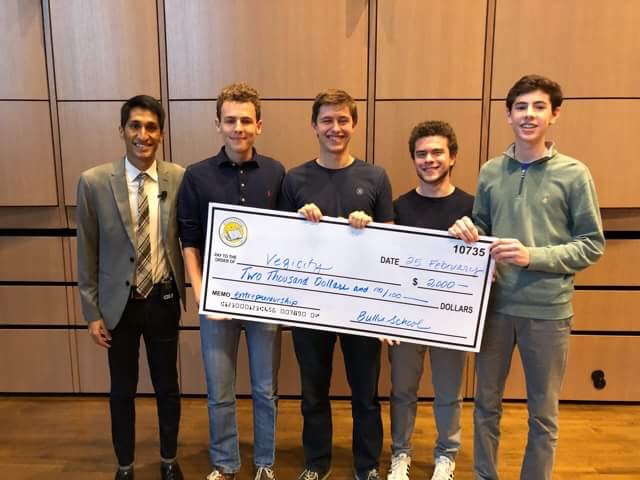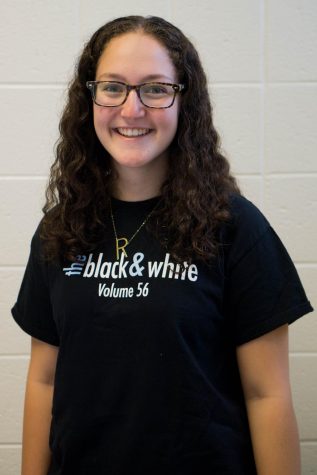Four students win Social Entrepreneurship Tournament, start business with seed money
Students stand with thier prize money. Four students won the Social Entrepreneurship Tournament Feb. 24-25 with their business pitch for VegiCity, a company that would help families grow their own fresh produce. Photo courtesy Alex Manes.
March 11, 2018
Four students won the Social Entrepreneurship Tournament for High School Students at the Bullis School Feb. 24-25. The competition involves participants pitching a solution to a social issue. The problem this year combined two issues: fruit and vegetable prices and healthy food going to waste. Seniors Alex Manes, Xavier Del Cerro and Carsten Barnes and junior Jared Lapidus received $2,000 as seed money for their winning project, VegiCity.
VegiCity provides garden starter kits to participating families to plant produce in their backyards. A high school volunteer assists in growing the food for as long as the family needs. All excess food is donated to a local food bank or homeless shelter, Del Cerro said.
“Team chemistry—that’s how we won,” Lapidus said. “We were the group who had the most fun and we got along really well with our mentor. That was important.”
The tournament lasted two days and incorporated six groups, each accompanied by a mentor to guide the discussion. The team’s mentor, Xan Avendaño, is a public policy masters student in the Do-Good Institute at the University of Maryland.
“The students had contagious energy,” Avendaño said. “They took malnourishment and food sustainability—two giant problems—and creatively whittled them down to an implementable project. It was so inspiring to watch them fire ideas back and forth. The students were as thoughtful as legislators and business leaders. They truly embraced the idea that businesses can be and should be for good.”
The first day featured morning workshops on design thinking, correct methods of interviewing and other aspects vital to entrepreneurship, Manes said. The group then created an initial idea. Sunday, the group pitched their idea to fellow competitors and mentors. Groups then had three hours to redesign their pitches to fix key errors pointed out in the first pitch.
During this time, the group ended up completely changing their original idea, Manes said.
“We just got destroyed,” Manes said. “I would say we were one of the worst presentations. We just didn’t have enough information to back it up. We were relying a lot on assumptions. What we ended up with was a similar idea, except now it was targeted at suburban, upper middle class families. We stayed with vegetables, but we just really changed our target demographic.”
The group presented their final presentation to a judge Sunday afternoon. Whitman’s group included a detailed flowchart, which the judge mentioned as one of the reasons he chose their project.
Except for Barnes, the members of the group all participate in Whitman’s DECA team. They cited the skills they learned through that as a reason for them winning.
“We used a lot of public speaking skills that we learned in DECA,” Lapidus said. “Also creating PowerPoints and presentations about businesses helped us create our PowerPoint for VegiCity.”
With the seed money, Lapidus is planning to start VegiCity and is currently seeking students to help him since the seniors are graduating in the spring. Once he starts the business, Lapidus will be able to receive the prize money with a detailed invoice on where it will go.
“I think we were the most applicable and realistic but also the most creative one as well,” Manes said. “It was a big challenge we saw ahead of ourselves, but somehow we came together and pulled it off.”
People interested in purchasing products from Vegicity can email Jared Lapidus at [email protected]







